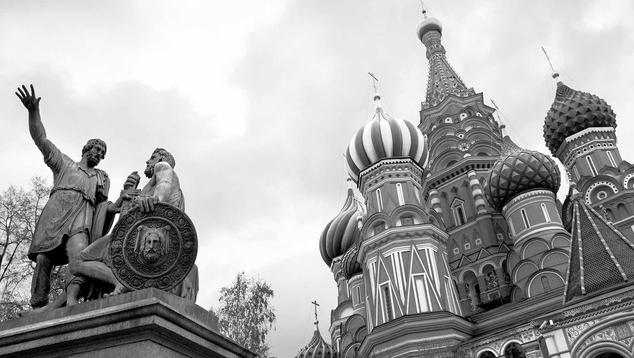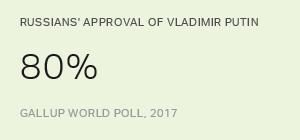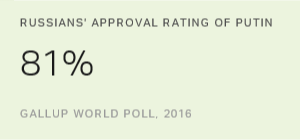Story Highlights
- Percentage of working-age Russians who would like to move has at least tripled
- 12% who approve of Putin want to migrate vs. 40% who don't approve of him
- Germany, U.S. are top desired destinations
WASHINGTON, D.C. -- Adding to the bad news last month that Russia is dangerously close to a full-blown demographic crisis, with its population declining for the first time in a decade in 2018, a new high of one in five Russians (20%) now say that they would like to leave Russia if they could.
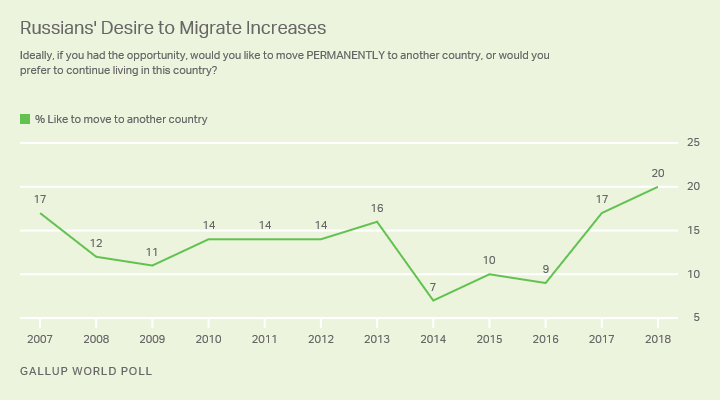
While not all of these Russians will move, the higher desire in recent years should concern Moscow. Larger potential migration numbers could accelerate the population decline, and losses could potentially exceed the 8% of the population that the United Nations currently projects Russia to lose by 2050.
But the "who" may be just as concerning for the country's future economic position and political influence as the "how many." Since 2014, the percentage of working-age Russians who say they would like to move has at least tripled, jumping from 14% to 44% among 15- to 29-year-olds, from 7% to 22% among those between the ages of 30 and 45 and from 3% to 9% among those aged 46 to 60.
Although young people typically are more likely to want to migrate -- as they are the most mobile within a population -- the 44% of the youngest Russians who want to move is unprecedented in Russia within the past decade.
| Would like to move to another country | ||||||||||||||||||||||||||||||||||||||||||||||||||||||||||||||||||||||||||||||||||||||||||||||||||||
|---|---|---|---|---|---|---|---|---|---|---|---|---|---|---|---|---|---|---|---|---|---|---|---|---|---|---|---|---|---|---|---|---|---|---|---|---|---|---|---|---|---|---|---|---|---|---|---|---|---|---|---|---|---|---|---|---|---|---|---|---|---|---|---|---|---|---|---|---|---|---|---|---|---|---|---|---|---|---|---|---|---|---|---|---|---|---|---|---|---|---|---|---|---|---|---|---|---|---|---|---|
| % | ||||||||||||||||||||||||||||||||||||||||||||||||||||||||||||||||||||||||||||||||||||||||||||||||||||
| Age | ||||||||||||||||||||||||||||||||||||||||||||||||||||||||||||||||||||||||||||||||||||||||||||||||||||
| 15 to 29 | 44 | |||||||||||||||||||||||||||||||||||||||||||||||||||||||||||||||||||||||||||||||||||||||||||||||||||
| 30 to 45 | 22 | |||||||||||||||||||||||||||||||||||||||||||||||||||||||||||||||||||||||||||||||||||||||||||||||||||
| 46 to 60 | 9 | |||||||||||||||||||||||||||||||||||||||||||||||||||||||||||||||||||||||||||||||||||||||||||||||||||
| Education | ||||||||||||||||||||||||||||||||||||||||||||||||||||||||||||||||||||||||||||||||||||||||||||||||||||
| Primary or less | 20 | |||||||||||||||||||||||||||||||||||||||||||||||||||||||||||||||||||||||||||||||||||||||||||||||||||
| Tertiary | 19 | |||||||||||||||||||||||||||||||||||||||||||||||||||||||||||||||||||||||||||||||||||||||||||||||||||
| College education or higher | 24 | |||||||||||||||||||||||||||||||||||||||||||||||||||||||||||||||||||||||||||||||||||||||||||||||||||
| Urban/Rural | ||||||||||||||||||||||||||||||||||||||||||||||||||||||||||||||||||||||||||||||||||||||||||||||||||||
| Urban | 23 | |||||||||||||||||||||||||||||||||||||||||||||||||||||||||||||||||||||||||||||||||||||||||||||||||||
| Rural | 13 | |||||||||||||||||||||||||||||||||||||||||||||||||||||||||||||||||||||||||||||||||||||||||||||||||||
| Gallup World Poll, 2018 | ||||||||||||||||||||||||||||||||||||||||||||||||||||||||||||||||||||||||||||||||||||||||||||||||||||
Russia could face losses of workers from all educational backgrounds -- and potentially all skill levels -- not just the most educated Russians. At least one in five Russians with primary education or less (20%), some tertiary education (19%) and college degrees or higher (24%) say they would like to leave Russia permanently.
Potential losses in all these demographic groups could have negative implications on the future of Russia's already-stressed pension system -- which Russia attempted to shore up in 2018 by raising the retirement age for men (from 60 to 65) and women (from 55 to 60).
Fingers Point to Putin
If these demographic losses turn Russia into the "empty space" that President Vladimir Putin warned Russians about during his 2012 campaign, he may be at least partly to blame. Gallup's analysis* shows that even after accounting for demographics and income, Putin's job approval has had a strong effect on Russians' desire to migrate.
In 2018, 12% of adults who approve of Putin's job performance would like to migrate, while 40% of those who do not approve of Putin would like to migrate.
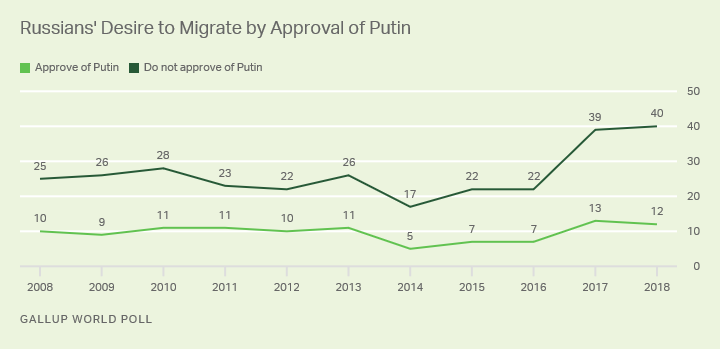
Looking back over time, between 2008 and 2013, Russians' desire to migrate slowly increased, while approval of Putin's job performance slowly decreased. But in 2014 -- a patriotic year for Russians highlighted by Crimea joining Russia and the successful Sochi Olympic Games -- approval of Putin shot up by 31 percentage points to 83% and desire to migrate dropped to as low as 7%. And Russians were only further unified under the sanctions from the West.
This enthusiasm about Putin and the country lasted for a couple more years, and then desire to migrate started to go up, and in 2018 it reached the highest point in the last 11 years -- 20%. At the same time, Putin's approval started to go down -- dropping in 2018 to 63%, which is the lowest level in the past five years.
Gallup recently saw a similar relationship between leadership approval and desire to migrate in the U.S., where a record 16% said they would like to move in 2017-2018. The difference between the situations in the U.S. and Russia is that while U.S. population growth is slowing, it is still growing.
Economic Conditions Less of a Factor
While it may be tempting to blame Putin's falling approval ratings and the rising desire to migrate on Russia's ongoing economic woes, Russia's economy has been in a spiral for years. Putin's approval ratings have been largely immune to the country's economic troubles. Still, economic conditions in Russia, too, are a factor in Russians' desire to migrate. Those who say their local economy is getting better (18%) are less likely to want to migrate than those who say it is getting worse (27%).
Where Do Russians Want to Go?
With so many Russians desiring to leave Russia, the next logical question is where would they like to go if they could leave? Although relations between Russia and the West -- the EU the U.S. in particular -- have been strained after the situation in Ukraine and military posturing regarding NATO, Russians who desire to migrate most often name a country within the European Union (40%), followed by Northern America (16%). Russians are most likely to name Germany (15%) and the U.S. (12%) specifically.
| Country would move to | |||||||||||||||||||||||||||||||||||||||||||||||||||||||||||||||||||||||||||||||||||||||||||||||||||
|---|---|---|---|---|---|---|---|---|---|---|---|---|---|---|---|---|---|---|---|---|---|---|---|---|---|---|---|---|---|---|---|---|---|---|---|---|---|---|---|---|---|---|---|---|---|---|---|---|---|---|---|---|---|---|---|---|---|---|---|---|---|---|---|---|---|---|---|---|---|---|---|---|---|---|---|---|---|---|---|---|---|---|---|---|---|---|---|---|---|---|---|---|---|---|---|---|---|---|---|
| % | |||||||||||||||||||||||||||||||||||||||||||||||||||||||||||||||||||||||||||||||||||||||||||||||||||
| Germany | 15 | ||||||||||||||||||||||||||||||||||||||||||||||||||||||||||||||||||||||||||||||||||||||||||||||||||
| United States | 12 | ||||||||||||||||||||||||||||||||||||||||||||||||||||||||||||||||||||||||||||||||||||||||||||||||||
| Japan | 5 | ||||||||||||||||||||||||||||||||||||||||||||||||||||||||||||||||||||||||||||||||||||||||||||||||||
| Canada | 5 | ||||||||||||||||||||||||||||||||||||||||||||||||||||||||||||||||||||||||||||||||||||||||||||||||||
| Spain | 5 | ||||||||||||||||||||||||||||||||||||||||||||||||||||||||||||||||||||||||||||||||||||||||||||||||||
| France | 4 | ||||||||||||||||||||||||||||||||||||||||||||||||||||||||||||||||||||||||||||||||||||||||||||||||||
| Gallup World Poll, 2018 | |||||||||||||||||||||||||||||||||||||||||||||||||||||||||||||||||||||||||||||||||||||||||||||||||||
Implications
Despite the government's efforts to encourage more births in Russia, even more births now will not solve the country's workforce shortfalls in the near future. To that end, the country is starting to look outside its borders to shore up its declining population. Putin's new migration policy for the next six years involves granting citizenship to millions of migrants from Russian-speaking countries such as Ukraine, Kazakhstan, Uzbekistan and Moldova.
But in addition to looking outside its own borders, Russia would be well-served to look hard at why so many more Russians would like to move away in the first place, and look for ways to not only retain them, but to entice the Russians who may have already left to return.
Dato Tsabutashvili contributed to this analysis.
*Regression analysis controlled for demographics such as income, age, education and urban/rural location.
Learn more about how the Gallup World Poll works.
